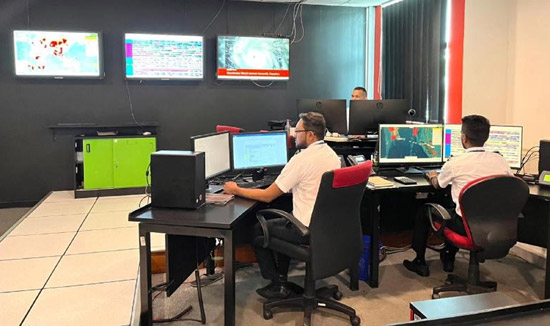Flight despatchers; holding turbulence in sky at bay
Current climate change is making airplane turbulence more common and severe due to warmer air and changes in wind patterns. The impact of turbulence varies mainly due to vertical wind shear instabilities, convection, mountain waves, flight routes and the type of aircraft.
In recent years, there have been many in-flight turbulence incidents reported in different parts of the world. Some of these incidents were experienced by leading global airlines.
The flight dispatchers of SriLankan Airlines, hold a licence issued by the Civil Aviation Authority of Sri Lanka, and play a crucial role in ensuring the safety and efficiency of airline operations by analysing weather data, including turbulence forecasts and other meteorological information such as cyclonic activities, icing, and volcanic eruptions to determine the safest and most efficient route for each flight.
The flight dispatcher, who is essentially responsible for planning the flight, makes every effort to avoid turbulent weather patterns, ensuring the safety of passengers and crew. Commercial airlines use their flight planning systems and many other sources to obtain turbulence forecasts.

Flight despatchers
Dispatchers also consider factors such as fuel efficiency, performance limitations of the aircraft, air traffic constraints, ensuring compliance with regulatory requirements, airline policies and navigational facilities of airports along the route when deciding on a route, in addition to weather data.
They are responsible for ensuring the on-time preparation and provision of all necessary flight planning documents, information, data assistance to the flight crew for the safe conduct of flights. Before each flight, dispatchers provide pilots with comprehensive briefings that include weather updates, potential hazards, alternate routes, and other relevant information, along with all necessary flight planning documents.
Fighting turbulence
Climate change and global warming result in the build-up of significant air pressure differences in the atmosphere, leading to jet streams and clear-air turbulence (CAT). CAT occurs when air masses move turbulently without any visual clues, such as clouds. CAT can be hazardous to air travellers’ comfort and occasionally their safety, as pilots may not foresee it. Therefore, passengers are urged to follow seat belt signs and adhere to crew instructions.
Unlike in the past when long-term weather patterns were similar throughout the year, today the conditions are unpredictable. Standardised checks are carried out at the planning stage, but weather forecasts can change at any time. Even after departure, sudden weather changes could occur, and flight dispatchers assist pilots by providing information on weather behaviours to take precautionary measures.
Flight Operations Manager at SriLankan Airlines, Gopitha Ranasinghe, pointed out that global environmental changes have resulted in experiencing severe turbulence, which was not prevalent in the past. He also noted extreme warmer weather in West Asia during peak summer and extreme colder weather conditions in Europe during winter.
During flights, dispatchers continuously monitor progress in real-time using flight tracking systems. They maintain communication with pilots to offer updated weather information, route adjustments, and any necessary instructions, assisting pilots in decision-making during unexpected situations including severe weather. Dispatchers ensure all flight operations adhere to safety standards and regulatory requirements set by aviation authorities, coordinating with airport and air traffic control authorities to ensure smooth operations.
Operating from
the centre
The Airline Operations Control Centre is the command centre of an airline. Its main function is exercising authority over the initiation, continuation, diversion, and termination of a flight in the interest of safety and security of the aircraft, adhering to original equipment manufacturers’ and regulatory requirements. The flight dispatcher at the Airline Operations Control Centre has no limitations but constantly monitors all factors pertaining to the safety and security of the flight in progress.
They also monitor volatile geopolitical situations and consider required remedial actions to mitigate the impact on commercial air transportation.
To ensure high safety standards, the International Civil Aviation Organization (ICAO) has mandated the flight tracking function for airline operators. This ensures that the exact position of the aircraft can be determined according to laid-down procedures. The flight dispatcher carries out real-time flight monitoring by maintaining constant communication with aircraft in the air. In addition to the above, the Airline Operations Control Centre is responsible for managing the flight schedule and handling flight disruptions in day-to-day operations.
Safety on-board
Flight dispatchers are critical to airline safety as their expertise in analysing weather and potential hazards helps prevent accidents. They contribute to operational efficiency by optimising flight routes and managing fuel consumption, reducing costs, and minimising environmental impact. In case of emergencies, dispatchers provide essential support to pilots, helping them make informed decisions to ensure the safety and well-being of everyone on board.
Acting as a communication bridge between pilots, air traffic control, and other stakeholders, dispatchers ensure clear and timely communication, vital for smooth operations. They have the authority to delay, cancel, or reroute flights if necessary, maintaining control over flight operations in the interest of safety and efficiency. By ensuring compliance with all regulatory requirements, flight dispatchers are indispensable to the aviation industry, providing the expertise, support, and oversight necessary for safe and efficient flight operations.
| New series | |
| This week The Sunday Times Business together with SriLankan Airlines commences the first in a series of articles on the roles of critical persons onboard the national carrier SriLankan Airlines to give readers a glimpse into how they are cared for every time they travel in the sky.
|
Hitad.lk has you covered with quality used or brand new cars for sale that are budget friendly yet reliable! Now is the time to sell your old ride for something more attractive to today's modern automotive market demands. Browse through our selection of affordable options now on Hitad.lk before deciding on what will work best for you!


